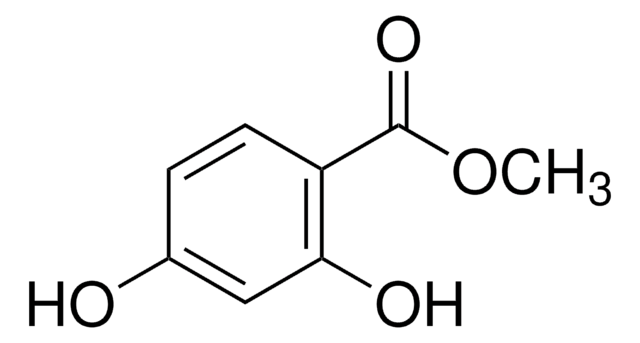D109401
2,4-Dihydroxybenzoic acid
97%
Synonym(s):
β-Resorcylic acid
Sign Into View Organizational & Contract Pricing
All Photos(4)
About This Item
Linear Formula:
(HO)2C6H3CO2H
CAS Number:
Molecular Weight:
154.12
Beilstein:
1946213
EC Number:
MDL number:
UNSPSC Code:
12352100
PubChem Substance ID:
NACRES:
NA.22
Recommended Products
Quality Level
Assay
97%
form
powder
mp
208-211 °C (dec.) (lit.)
SMILES string
OC(=O)c1ccc(O)cc1O
InChI
1S/C7H6O4/c8-4-1-2-5(7(10)11)6(9)3-4/h1-3,8-9H,(H,10,11)
InChI key
UIAFKZKHHVMJGS-UHFFFAOYSA-N
Looking for similar products? Visit Product Comparison Guide
Related Categories
Application
2,4-Dihydroxybenzoic acid (DHBA) can be used as a starting material for the synthesis of resorcinol-based N-benzyl benzamide derivatives , hydroxylated and prenylated xanthones , and mycophenolic acid.
It can be also used as a reactant in the synthesis of DHBARF polymer aerogels by reacting with formadehyde (F) and resorcinol (R).
It can be also used as a reactant in the synthesis of DHBARF polymer aerogels by reacting with formadehyde (F) and resorcinol (R).
Signal Word
Warning
Hazard Statements
Precautionary Statements
Hazard Classifications
Skin Sens. 1
Storage Class Code
11 - Combustible Solids
WGK
WGK 1
Flash Point(F)
Not applicable
Flash Point(C)
Not applicable
Personal Protective Equipment
dust mask type N95 (US), Eyeshields, Gloves
Choose from one of the most recent versions:
Already Own This Product?
Find documentation for the products that you have recently purchased in the Document Library.
Customers Also Viewed
Design, synthesis, and biological evaluation of a series of resorcinol-based N-benzyl benzamide derivatives as potent Hsp90 inhibitors
Park SY, et al.
European Journal of Medicinal Chemistry, 143, 390-401 (2018)
Jafar Ebrahimifar et al.
Insects, 11(9) (2020-09-05)
The ladybird beetle Stethorus gilvifrons (Mulsant) is an important natural enemy of tetranychid mites and functions as a biological control of these plant pests. The development, survival and reproduction of S. gilvifrons were studied when fed on three artificial diets.
Core-shell polymer aerogels prepared by co-polymerisation of 2, 4-dihydroxybenzoic acid, resorcinol and formaldehyde
Carrott PJM, et a.
Microporous and Mesoporous Materials : The Official Journal of the International Zeolite Association, 158(14), 170-174 (2012)
Potential of 2,4-Dihydroxybenzoic Acid as an Oviposition Stimulant for Mass-Reared Ladybird Beetles.
E W Riddick et al.
Journal of insect science (Online), 19(2) (2019-03-02)
The discovery of inexpensive, readily available bioflavonoids, and their degradation products that boost the reproductive potential of mass-reared predators is the overarching goal of this research. We tested the hypothesis that 2,4-dihydroxybenzoic acid (DHBA), an inexpensive degradation product of morin
The synthesis of mycophenolic acid from 2, 4-dihydroxybenzoic acid
Patterson JW
The Journal of Organic Chemistry, 60(14), 4542-4548 (1995)
Our team of scientists has experience in all areas of research including Life Science, Material Science, Chemical Synthesis, Chromatography, Analytical and many others.
Contact Technical Service


![2-Methyltetrahydro-2H-pyrazino[1,2-a]pyrazine-1,4(3H,6H)-dione](/deepweb/assets/sigmaaldrich/product/structures/315/697/da7c9074-ad96-4087-9371-7992d88d14b8/640/da7c9074-ad96-4087-9371-7992d88d14b8.png)








